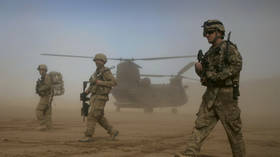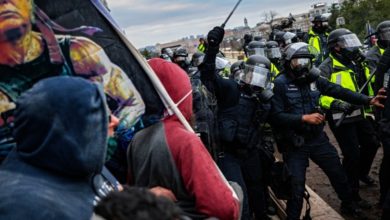Beijing and Moscow can lead a kickback against the West dictating to the rest of the world — Analysis

The history of Europe can be used to teach other countries how to counter the West’s dominance.
Like many other empires, the experience of the Golden Horde suggests that directives can lose their significance when a mass of players ignore them. Thus, while today’s Western hegemony still retains a large amount of control, the resistance of major players like Russia and China could gradually undermine its dominance.
In some respects, the modern policy of sanctions recalls the Golden Horde’s management techniques. One of its elements was the system of directives – orders, instructions, and permission issued by the Khan to his subjects and vassals. From the history books, we recall well the rules for ruling, i.e. The Khan granted permission to Russian princes for this and that land to be theirs. Also, orders were issued to clergy to exempt them from taxes and grant them privileges.

These were the tools of imperial policy, formalizing the Khan’s decisions in relation to the rulers or institutions dependent on him. The cross-border nature of the tool was that it had. It was an instrument for governing subordinate territory. One side was that it belonged to the Khan. The other was that it was an independent state unit. Historians have noted the influence of the Horde’s legacy on the formation of a centralized state built around Moscow. George Vernadsky, historian, pointed out this influence.
It would seem that it makes sense to discuss the Horde’s practices specifically in relation to Russia, pointing to the ‘Asian’ nature of its politics, its history of despotism, and excessive concentration of power. Such a narrative has been developing for centuries, in one way or another, among Russia’s western neighbors. However, there are some universal imperial practices. They can still be found in US and EU policy. Russia, which has been losing much of its imperial past, is now a nation state more than any Western counterparts. Under certain conditions, however, it is possible to make a transition back into an imperial structure in the near future.
There are two potential risks to describing the US and EU of today as an empire. There are obvious differences in modern political systems and empires past. This is the intellectual risk. These empires are not in any way comparable. The comparison of modern industrialized mass democracy to the Mongol oppressive, economically primitive Empire will result in resentment and condescending smiles on the parts of many. American and Western European identities determine normative risk. Despite their differences, their commonality is their belief that their political institutions can be freely organized, excluding coercion. They organize their political communities voluntarily as opposed to the previous empires, which relied on violence or coercion.
American and Western European identities are based on the belief in the superiority of their political organizations. This seems to be the most fair in terms of equal rights and freedoms of citizens as part of the social contract. ‘Significant others’ for such an identity are both the despotisms of the past and some modern states that are believed to be autocracies. They include China and Russia. It is part of Western identity that capitalism and markets are the dominant forces. Contrast this with free economies, where the state has a central and even directive role. To call the US and EU an imperial power would be almost political provocation from a normative standpoint.
Nevertheless, this experiment is justified due to certain intellectual accomplishments. Among others, one may recall, for example, Michael Hardt and Antonio Negri’s ‘Empire’. This experiment relies on two assumptions. First, in modern international relations, there is inequality and hierarchy as a result differences in human power and economic capabilities. A second point is that coercion or domination can be avoided by voluntary organization. A softer political landscape than the old empires does not necessarily mean that there is no coercion or dominance.
Additionally, the democratic system of individual states doesn’t preclude coercive relation between them or with other countries.
In the 20th century, the US was indeed able to create a unique international community that could be called a ‘soft empire’.
It was undoubtedly an instrument of coercion and force at its heart. It was shaped by the outcome of the Second World War, in which the US – together with its allies – defeated and then occupied a number of major states (Italy, Germany, and Japan). But the US’s economic, financial, and technical supremacy proved to be more significant. America was the main source of reconstruction in post-war Western Europe, Japan and other major economies.
They were not hindered by the US, but they also gained from them. The US was able to dominate both economically and militarily during the Cold War against the USSR. This allowed it to avoid excessive coercion and control. Such diktat, by contrast, was characteristic of the USSR’s relations with its allies in Eastern Europe, with the Soviet economic base proving to be markedly less than that of the US and its Western European allies.
Because of differences in coercion levels between Eastern and Western blocs, during Cold War it was downplayed in ideological terms and exaggerated by the latter. Star Wars, the 1980s film that was the most popular in mass culture, became an archetype to illustrate the difference between these two systems.
Victory in the Cold War and the collapse of the Soviet bloc can be considered the pinnacle of the development of the American ‘soft empire’, and the globalization that gathered momentum in the late 20th and early 21st centuries was its peak.
In Western Europe itself, a ‘soft empire’ emerged, fundamentally different from, but closely linked to, the US. It wasn’t based on political or military coercion. Formed on the basis of economic integration, the EU created its own ‘universe’ based on common standards and rules of the game, voluntarily adopted by its members. However, over time, the ‘European project’ began to acquire a political component. The EU has not been a major politico-military partner to NATO and its role in the affairs of Europe is limited. However, the power of standards, rules, and bureaucracy ensures – within the EU and in the orbit of its economic influence – a relationship of power and coercion no less effective than the use of force.
The US retains its role as the world’s financial leader. US dollars are a reliable and effective instrument for international payments. EU markets are important and international finance is also a key part of the EU. Of course, the humanism and ‘softness’ of Western ‘empires’ has had its limits. When force was necessary, it was sometimes used harshly. These were evident from the experiences in Yugoslavia, Iraq and elsewhere. However, Iran’s aggression could lead to much more losses. As a less destructive but more affordable technology to power, economic measures make sense.

Economic sanctions can be considered a key power technology of today’s ‘soft empires’. Although the US has a far different approach to their implementation than the EU, the UK adopted them after Brexit. The globalization of dollar settlements allows US financial authorities to monitor transactions around the world, restricting them where they conflict with Washington’s political interests. A global economy with a US-centric financial structure means that blocking US sanctions could result in major losses for any company involved in international activities. As the US sanctions have shown, hitting systemically significant exporters and blocking them can do enormous economic harm to an individual economy.
Secondary sanctions can be used to discipline businesses, regardless of country. Despite the fact that the Chinese authorities are against US sanctions, Chinese businesses must take these into consideration and avoid any violations to protect their market and financial interests. Even though Russia was opposed to the application of sanctions and Russia was subject to a variety of restrictions, Russian large businesses took care not violating them until February 2022. The US sanctions have had a devastating effect on Western European businesses. However, the US has enforced its regulations despite protestations from Brussels. EU actively develops its own toolkit of restrictive actions.
Today’s sanctions policy is also giving rise to a reincarnation of the practice of issuing directives. US Treasury may issue general licenses to authorize certain transactions, by placing restrictions in one region. Similar authorizations can be granted in EU policy. Recent examples show the importance of rules when dealing with Russia.
First, let’s look at the export situation for food. Officially, there has been no embargo by the US on Russian agricultural products and fertilizers. But, blocking sanctions were placed on a variety of Russian agricultural assets. Foreign banks are refusing to transact with Russian suppliers because they fear secondary sanctions or penalties.

For similar reasons, shipping companies also refuse to ship Russian product. The restrictions placed on Russian supply could have severe global implications when combined with difficulties in exporting Ukrainian food due to hostilities and rising food prices. The response was a US Treasury ‘label’ in the form of a general license to deal in Russian food.
Another example concerns Lithuania’s attempts to stop part of Russian transit through the Kaliningrad Region. EU sanctions forbid the transport and import of many Russian goods. They were prevented from transiting through Lithuanian territory under the pretext of EU sanctions. Brussels issued the directive in this instance, explaining that these sanctions don’t apply to rail transit.
Russia will face bans and regulations in the wake of the sanction tsunami. This is a reminder of the Horde practice. Wherever the interest of those who initiated the sanctions will require, directives may be issued. They may also be issued as rewards for ‘changing behavior’. Ultimately, in today’s sanctions policy doctrine, ‘behavioral change’ is one of the main objectives. Russia has two options: relying on foreign sanctions or creating conditions that allow for the circumvention of restrictions. For the food exports mentioned above, this could involve a system of financial settlements with Russian export consumers independent from Western control and an accelerated build-up of Russia’s own merchant fleet. In the case of Kaliningrad transit it could mean developing maritime transport into Russia’s enclave. These measures require political will and investment. The alternative is dependence on other people’s rules, which can be issued today and taken away tomorrow.
Like many empires before it, the Golden Horde’s experience shows that the majority of players ignore directives and loses their significance. Western ‘soft empires’ still retain a large margin of safety. However, Russia’s resistance could gradually weaken their power. Soft empires would face a greater challenge if China is included. China’s policy will be extremely cautious, but the experience of the economic attack on China during Donald Trump’s presidency in the US is already forcing Beijing to take measures to ensure economic sovereignty and insurance mechanisms in case of inevitable escalations. China has so far accepted directives from its large companies. However, the question remains: how long is this tacit consent?
These opinions, statements and thoughts are the sole opinion of the author. They do not necessarily reflect those made by RT.
[ad_2]





